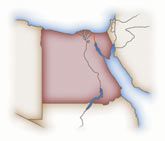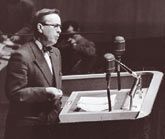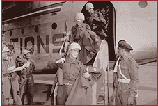
Suez crisis
Louis S. St. Laurent National Historic Site
 Map of Egypt
Map of Egypt© Parks Canada
On July 26, 1956, the Egyptian President, Gamal Abder Nasser, nationalized the Suez Canal which, at the time, was owned by the Franco-British Suez Canal Company. The nationalization of this seaway between the Mediterranean and the Red Sea was ill-received by certain western countries, and most particularly by France and Great Britain, who considered it to be a direct blow to their international trade.
Aware of the strategic and economic importance of the canal, France, Great Britain and Israel came to a secret agreement under the terms of which Israel would attack Egypt, and the other two countries would then intervene on the pretext that they were safeguarding the canal.
According to plan, the attack took place on October 29, 1956. Israeli paratroopers were dropped 40 km away from the canal, and the next day the Franco-British coalition sent an ultimatum to both Egypt and Israel, calling for a cease-fire and demanding that they withdraw to a distance of 16 km from the canal. When Egypt refused to comply, France and Great Britain took direct action: on October 31, they bombarded Egyptian airfields. The Middle East was set to explode and there seemed to be a serious threat of a Third World War.
 Lester B. Pearson, Secretary of State for External Affairs, addressing the Un general assembly
Lester B. Pearson, Secretary of State for External Affairs, addressing the Un general assembly© National Archives of Canada / C-18706
Privately, St-Laurent was extremely upset by this military intervention which, amongst other things, seemed likely to break up the Commonwealth. He had no hesitation in condemning the steps taken by the belligerents. The Canadian government's response, though moderate and conciliatory, given the circumstances, surprised Great Britain, which had hoped for Canadian backing at this point.
St-Laurent then asked his Secretary of State for External Affairs, Lester B. Pearson, to solve the crisis. Behind the scenes, a great number of strings began to be pulled. On November 4, Pearson, assisted by his UN colleagues, suggested sending an international force to supervise the cessation of fighting. This force, which would include Canada, would be under Canadian command. The General Assembly of the United Nations accepted this proposal, as did the belligerents, who were coming under pressure from the international community, especially from the United States and the USSR.
 Canadian members of the UN Peace Force arriving in Egypt
Canadian members of the UN Peace Force arriving in Egypt© Parks Canada
Around mid-November, the emergency task troops arrived in the Suez Canal Zone. A few days later, the occupying troops began to move out, and negotiations started with a view to ending the crisis.
Although Pearson was congratulated on his action by representatives from other countries, and in particular by the United Kingdom, a pro-British segment of the English-Canadian electorate was highly indignant. They believed that Canada should have shown more support for Great Britain, arguing that Britain's actions had been taken to preserve its honour and position in the world economy. This "treasonable act" was probably one reason for the defeat of the Liberals in the general elections of 1957.
As for Pearson, he received the Nobel Peace Prize in 1957, for his action during the crisis.
Sources:
Bothwell Robert, "Uncle Louis At The Wheel", Horizon Canada, Brampton, Ontario, Centre for the Study of Teaching Canada, Vol. 10, c1984-1987.
Hillmer, Norman, "Suez Crisis", The Canadian Encyclopedia, Edmonton, Hurtig Publishers, Vol. 4, c1988.
Quinn, Majella and Claude Marcil, Louis-S. St-Laurent, Jurist, Politician and Statesman, Ottawa, Minister of Supply and Services Canada, c1982, 47 p.
Thomson, Dale C, Louis St-Laurent: Canadian, Toronto, Macmillan of Canada, c1967, 564 p.
- Date modified :